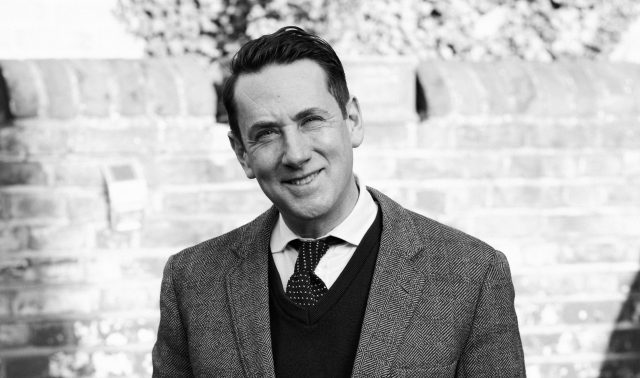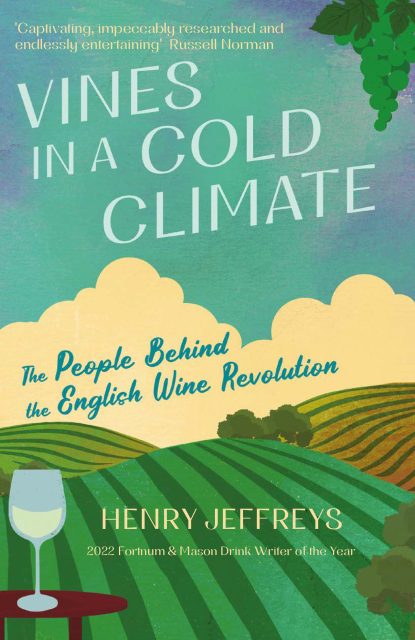This website uses cookies so that we can provide you with the best user experience possible. Cookie information is stored in your browser and performs functions such as recognising you when you return to our website and helping our team to understand which sections of the website you find most interesting and useful.
Meet The Author: Henry Jeffreys
Henry Jeffreys, Fortnum & Mason drinks writer of the year, editor at Master of Malt, and wine columnist for The Critic Magazine, talks to Douglas Blyde about his latest book, Vines in a Cold Climate, described by restaurateur Russell Norman as “the best book on wine I have read”.

Other than the witty altering of the title, does Vines in a Cold Climate have any other connections to the Nancy Mitford novel?
Ah, sadly not. A missed opportunity, perhaps?
Did your background in publishing help you pitch to publishers?
The idea for this book came from Derek Wyatt, former MP and international rugby player turned editor at large for Atlantic books, so I never pitched it to anyone. Though when they were thinking of potential authors, the head of publicity, Karen Duffy, who had once turned me down for a job in 2000 as a publicity assistant at Flamingo suggested my name, so in a roundabout way, my publishing experience may have clinched it…
How long did it take you to research, and then write, the book?
Just over a year, which was nowhere near enough time. I wish I could have had another six months to iron out all the kinks, but the publishers insisted it had to be published in 2023.
Is it an exhaustive compendium of producers, or a meaningful snapshot?
Definitely the latter. Rather than telling the history of English wine starting with Julius Caesar, I chose to do a sort of tour de Angleterre which would be accessible to the general reader rather than just wine bores like me. I chose a few representative, outspoken producers to show how we got where we are today, the problems and conflicts within the industry, and to look at what the future might bring.
Where do you anticipate English wine will be, in scale and reach, in five years’ time?
It’s very hard to say. There will certainly be a lot more of it, judging by all the grapes that are going in the ground. We’re likely to see the fizz-still ratio shift in favour of still. Sadly, there will be some casualties. Many producers are in a financially precarious position, and I think not all of the current businesses will last, but there will also be exciting new developments that we cannot imagine yet. I’d also put money on a big, probably French, company snapping up one of the larger sparkling wine producers.
How did you choose who to include?
The early days were quite easy: Peter Hall, Stephen Skelton, Nyetimber… But as we got closer and closer to the present day, it became harder and harder to narrow things down. Once I had some of the big names like Gusbourne in the bag, then it was a question of looking to who is doing something different, like Danbury Ridge with still wines, or tiny garage producers like Gutter & Stars. By about August 2022, I was actively trying to ignore any producers I hadn’t already visited because I had far too much information.
Did any producers decline to be featured?
Nobody declined, though I did write to some “information@” emails for various producers, or dropped them a line on LinkedIn, and never heard back. I would have chased but as I said, I was already drowning in brilliant stories.
To date, is it the book you are most proud of writing?
Yes, 100%. I’ve written two cocktail books which, though fun, were really commissions from publishers. Empire of Booze I am very proud of, but it’s mainly a synthesis of other history books. In contrast, Vines in a Cold Climate is based on first-person research. Trying to distil hours of interviews into a coherent narrative is the hardest thing I’ve ever done and to have the good feedback that I’ve had so far has been wonderful.

What difficulties did you encounter in producing the work?
Financially, it was a hell of a strain. My advance was tiny – and I only got the majority of it once the book was published. Master of Malt, my employer, was really good, letting me work three days a week, but that meant I had to fit all my visits into two days a week and weekends. Combine that with a young family – my youngest was only one when I began research – and you have a recipe for a very stressful home life.
Is any English wine in your opinion, ‘investment grade’?
If you’re asking whether it’s good enough to last and be traded, then I would say “yes” but will you make any money on it? That’s hard to say. Even the most legendary English wine, Nyetimber 1992 Blanc de Blancs, only sells for £200 at auction at the moment.
How much English wine do you drink each month?
Obviously, I get samples, but I do buy quite a bit of English wine. In the last month, I’ve bought Langham NV Rosé and Westwell Ortega which my wife, Misti, loves. Our neighbour is a massive English sparkling wine fan so we drink a lot with him.
Has preparing the book encouraged you to plant a vineyard of your own?
Quite the opposite! It’s made me aware that I don’t have the perfectionist mentality, nor indeed the money to make wine.
How is your book different to other recent releases written on English wine by Oz Clarke and Abbie Moulton?
I can’t compete with Oz’s depth and breadth of knowledge. He’s tried, and can recall, Breaky Bottom vintages from the 70s. He writes so beautifully as well; one of those writers who can set a scene in a sentence. So rather than do as Oz does and celebrate, I wouldn’t quite say I did the opposite, but I looked for where people aren’t getting along: the fault lines in the industry. Abbie’s is also very different. It’s a beautifully put-together coffee table book containing profiles of her favourite producers, merchants and restaurants. Mine has no profiles, nor indeed pictures.
How important to the book was your trusty old Mercedes?
My old Merc (a 1991 190E) was a joy to drive around the country in the spring and summer of 2022 when I did most of the research. It really made all the hours behind the wheel quite pleasurable. But it was also a time when petrol prices were going through the roof and it’s not the most frugal car, especially when driven enthusiastically on Kent country lanes.
Do you anticipate sales will be sufficient to allow you to take early retirement?
That would be nice but realistically, no. It’s a book about English wine. I wrote it because I thought it would be interesting, I’ll probably lose money on it.
But will there be a sequel?
I have a few ideas, actually. Watch this space…
Vines in a Cold Climate: the people behind the English wine revolution is published by Allen & Unwin. RRP £16.99
Related news
Vivino’s crowd reviews gain credibility in Cambridge study
Perrier-Jouët combines art and biodiversity in Ambonnay vineyard

